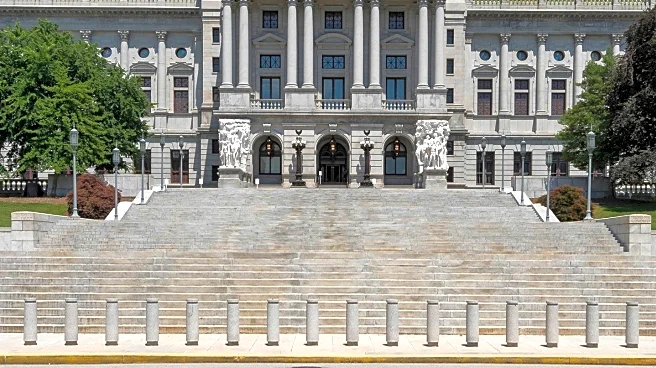What's Happening?
Eastern State Penitentiary in Philadelphia, once known for its 'Terror Behind the Walls' Halloween attraction, has shifted its approach to a more family-friendly event called 'Halloween Nights.' This change comes in response to ethical concerns about
using a site with a history of real suffering as a backdrop for entertainment. The penitentiary, originally a Quaker experiment in justice, was notorious for its harsh solitary confinement practices. The new event aims to balance entertainment with education about the prison's history and the broader criminal justice system. Similar ethical considerations are being addressed at other historical sites like the Lizzie Borden House and the Mütter Museum, which are also re-evaluating how they present their dark histories to the public.
Why It's Important?
The shift in how historical sites like Eastern State Penitentiary handle their past reflects a growing awareness of the ethical implications of 'dark tourism.' This trend has significant cultural and educational impacts, as it challenges attractions to respect the real-life tragedies associated with their locations while still engaging the public. The move towards more educational and respectful presentations can influence how society understands and processes historical injustices and tragedies. It also highlights the responsibility of cultural institutions to foster empathy and understanding rather than trivializing past suffering for entertainment purposes.
What's Next?
Eastern State Penitentiary and similar sites are likely to continue evolving their approaches to balance entertainment with education. This may involve ongoing dialogue with historians, ethicists, and the public to ensure that their presentations are both respectful and informative. The penitentiary's review board will play a crucial role in guiding these changes, ensuring that future events align with their mission of education and historical accuracy. As public awareness and sensitivity to historical injustices grow, other attractions may also face pressure to reassess their offerings.
Beyond the Headlines
The ethical considerations surrounding 'dark tourism' raise broader questions about how society engages with history and memory. These discussions can lead to a deeper understanding of the cultural and moral responsibilities of preserving and presenting historical sites. The challenge lies in finding a balance between acknowledging past atrocities and providing engaging, educational experiences that do not exploit or trivialize the suffering of those who lived through them.















